
World liver day is celebrated on 19th April every year to spread awareness about liver diseases and ensuring liver health. An unhealthy lifestyle is the main cause for the increasing incidences of liver diseases. Some of the other causes of liver disease include immune system disorders, viruses, genetics, and reactions to toxins.
Table of Content:-
The liver is the second largest organ and accounts for some of the most important functions of the body. Some of these functions of a liver include digestion of fat, removal of toxins from the body, and metabolism of proteins, carbohydrates, and fats. It also removes harmful constituents from the blood.
There are various types of liver diseases. However, no matter what type it is, it progresses in the same way. Here is how a liver disease progresses:
Inflammation

The swelling of the liver, also known as hepatitis is the first stage of liver disease. Inflammation of the liver means that your body is trying to fight off an infection or injury. But if this continues, your liver could get damaged permanently.
Inflammation does not cause any discomfort; hence it becomes difficult to know if there is any swelling in the liver. If the liver is diagnosed with inflammation at the first stage, with proper treatment it may go away.
Fibrosis
As the inflammation progresses, the liver begins to scar. The scarring of the liver is known as fibrosis – these scar tissue grows and replaces the healthy tissue. As scar tissue builds up, the healthy part of the liver becomes unable to perform its function. Scar tissue can also keep the blood from flowing through the liver.
Fibrosis can be diagnosed with a blood or an imaging test. To check how much scarring has been developed, a doctor would run a liver biopsy, for which a tiny part of the liver is taken and carefully studied in the lab.
The liver may be able to heal itself in case of an early diagnosis and treatment.
Cirrhosis

The severe scarring of the liver is known as cirrhosis. As cirrhosis becomes worse, the liver becomes unable to perform its job as the hard scar tissue replaces the soft healthy tissue, causing the liver to fall or fail in the future. Cirrhosis can also lead to liver cancer.
Some of the symptoms of cirrhosis include:
- Tiredness
- Bruising or bleeding
- Severe itching of the skin
- Loss of appetite
- Nausea and abdominal pain
- Sudden weight loss
- Yellowing of the skin and the eyes (jaundice)
- Gallstones
- Edema (painful swelling of the legs) and ascites (swelling of the abdomen)
- Mental problems such as cognitive impairment, sleep disorders or other mental conditions
A biopsy, blood and an imaging test could help diagnose cirrhosis to detect how much of the liver has been damaged so far. Once the condition has been diagnosed, the treatment can help slow or stop the liver damage. The treatment focuses on preventing further liver damage and reduce complications if any. At this stage it is important to protect the remaining healthy tissue.
Liver Cancer

Liver cancer occurs if the advanced scarring of the liver is present. Liver cancer is the growth and spread of unhealthy cells in the liver. Cirrhosis is the main reason for the development of primary liver cancer. It also occurs in people who do not have advanced scarring, especially in people chronic hepatitis B.
Liver cancer is diagnosed by blood tests, imaging tests and scans, angiograms and a biopsy.
Liver Failure
When the liver loses all its functions, it is known as a liver failure. The primary symptoms of liver failure include nausea, fatigue, diarrhea and loss of appetite. As liver failure progresses, the patient might experience confusion and extreme tiredness. A patient may even go into a coma.
Acute Liver Failure: It occurs suddenly and is a reaction to medication overdose or poisoning. Sometimes it occurs due to acute viral hepatitis or other liver diseases.
Chronic Liver Disease: It shows that the liver has been failing, possibly for years.
If the liver fails then the patient has to go undergo a liver transplant – the process of replacing the infected liver with a healthy liver.
Read more articles on Liver Cancer.
For more such articles, Download OnlymyHealth App.
How we keep this article up to date:
We work with experts and keep a close eye on the latest in health and wellness. Whenever there is a new research or helpful information, we update our articles with accurate and useful advice.
Current Version